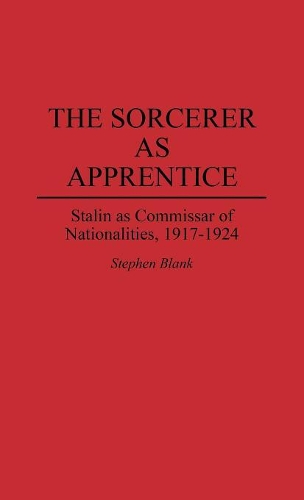
The Sorcerer as Apprentice: Stalin as Commissar of Nationalities, 1917-1924
(Hardback)
Publishing Details
The Sorcerer as Apprentice: Stalin as Commissar of Nationalities, 1917-1924
By (Author) Stephen J. Blank
Bloomsbury Publishing PLC
Praeger Publishers Inc
30th October 1994
United States
Classifications
Tertiary Education
Non Fiction
Warfare and defence
947.0842
Physical Properties
Hardback
312
Width 156mm, Height 235mm
595g
Description
This text suggests that the current struggles over nationality policy in Russia and in neighbouring states are rooted in the history of the Narkomnats and in policies that Stalin established as Commissar. This history, based in large part on primary research, describes the Commissariat of Nationalities from 1917 to 1924, Stalin's role as its chief and the policies that were the origins of the current ethnic dilemmas throughout the now collapsed Soviet Empire. The book is intended for scholars, students and policy-makers in European history and Slavic studies, and for general readers interested in the background of political and social conflicts in the former Soviet republics today.
Reviews
"Mr. Blank has performed a genuine public service in producing a work that discusses in great detail not just the Lenin-Stalin theory of the 'nationalities question' but the actual events, the actors, and the institutions that constructed the USSR out of the ruins of the Tsarist Empire. The history of the Narkomnats is therefore the history of the creation of the Soviet Union. The knowledge of that history is indispensable for an understanding of the present situation on the territory of the late USSR."-Firuz Kazemzadah Professor Emeritus Yale University
.,."In addition to contributing to scholarship on Stalin and the 1920's, the book has relevance for the 1990's. Once again Russia and its neighbors confront the establishment of a new, multinational, political entity, but they do so burdened by a history that denies the validity of true self-determination. Blank's volume provides a densely written and sobering lesson in nationality politics that Soviet specialists will want to consider in understanding post-Soviet affairs."-History Review of New Books
...In addition to contributing to scholarship on Stalin and the 1920's, the book has relevance for the 1990's. Once again Russia and its neighbors confront the establishment of a new, multinational, political entity, but they do so burdened by a history that denies the validity of true self-determination. Blank's volume provides a densely written and sobering lesson in nationality politics that Soviet specialists will want to consider in understanding post-Soviet affairs.-History Review of New Books
This is a well-documented, systematic study. Its particular strenth is the perceptive treatment given to the Soviet Eastern, largely Islamic peoples in the Volga region, the Urals, Caucasus and the Central Asian areas. It is an excellent institutional history. It provides an excellent base upon which subsequent studies of Soviet nationality policies can be more effectively and perceptively conducted.-Journal of Baltic Studies
"This is a well-documented, systematic study. Its particular strenth is the perceptive treatment given to the Soviet Eastern, largely Islamic peoples in the Volga region, the Urals, Caucasus and the Central Asian areas. It is an excellent institutional history. It provides an excellent base upon which subsequent studies of Soviet nationality policies can be more effectively and perceptively conducted."-Journal of Baltic Studies
..."In addition to contributing to scholarship on Stalin and the 1920's, the book has relevance for the 1990's. Once again Russia and its neighbors confront the establishment of a new, multinational, political entity, but they do so burdened by a history that denies the validity of true self-determination. Blank's volume provides a densely written and sobering lesson in nationality politics that Soviet specialists will want to consider in understanding post-Soviet affairs."-History Review of New Books
Author Bio
STEPHEN BLANK, Professor of Soviet Studies and National Security Analyst at the Strategic Studies Institute of the U.S. Army War College, coedited The Soviet Military and the Future with Jacob Kipp (1993). He is also the author of War and the New Thinking: Soviet Policies in Central and Latin America (1992) and Operational Strategic Lessons of the Soviet War in Afghanistan (1991).
